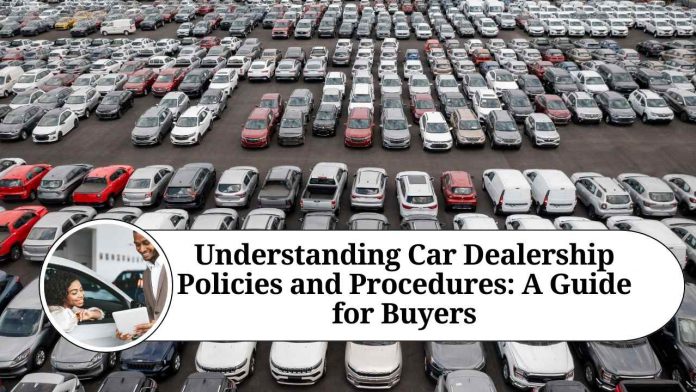Car dealerships are one of the primary sources for purchasing new and used cars. As a buyer, it’s essential to understand the policies and procedures that car dealerships follow. These policies can impact the car buying experience and can vary from dealership to dealership. In this blog, we’ll take a closer look at car dealership policies and procedures to help you make an informed decision when buying a car.
- Sales Policies
Car dealerships have specific policies and procedures that guide their sales process. These policies include how they approach and communicate with potential customers, how they negotiate prices, and how they handle trade-ins. Car dealerships are also required to adhere to state and federal laws governing the sale of vehicles.
One of the most common policies is the “no-haggle” pricing model, which means that the dealership does not negotiate prices with customers. This policy is becoming more prevalent in the car dealership industry, as it simplifies the buying process and reduces the chances of conflicts arising between the buyer and the dealership.
- Financing Policies
Car dealerships offer financing options for customers who want to purchase a car but cannot pay the full amount upfront. Dealerships have policies in place for financing, which include credit checks, interest rates, and loan terms. The dealership’s finance department is responsible for processing and approving financing applications.
Dealerships may also have partnerships with banks and other financial institutions to offer financing options to customers. It’s essential to understand the terms and conditions of the financing agreement and ensure that you can make the payments on time.
- Service and Maintenance Policies
Car dealerships offer services and maintenance to ensure that the cars they sell are in good condition. These services include routine maintenance, repairs, and warranty work. Dealerships have policies in place to ensure that these services are carried out effectively and efficiently.
For example, the dealership may have a policy that outlines the expected turnaround time for repairs and maintenance work. They may also have a policy on the types of parts and components used for repairs and replacements. It’s essential to understand these policies to ensure that you get the best service for your car.
- Return Policies
Car dealerships may have return policies in place that allow customers to return their car if they are not satisfied with it. These policies can vary depending on the dealership and the type of car purchased. Some dealerships may offer a full refund, while others may charge a restocking fee.
It’s crucial to understand the dealership’s return policy before making a purchase. This policy can impact your decision to buy a car and can provide peace of mind if you are not satisfied with your purchase.
In conclusion
Understanding car dealership policies and procedures is crucial when buying a car. It’s essential to research and compare different dealerships to find one that aligns with your needs and preferences. By doing so, you can ensure a smooth and stress-free car buying experience.
Other Related Blogs: Section 144B Income Tax Act
Frequently Asked Questions (FAQs)
Q: What is a no-haggle pricing policy?
A: A no-haggle pricing policy is when a dealership does not negotiate prices with customers. The price displayed on the car is the price that the customer will pay. This policy simplifies the buying process and reduces the chances of conflicts arising between the buyer and the dealership.
Q: What is a trade-in policy?
A: A trade-in policy is a policy that outlines how the dealership handles trade-ins. This policy can include the valuation process, the types of cars that can be traded in, and any requirements for trade-ins. It’s essential to understand this policy to ensure that you get a fair value for your trade-in.
Q: What is a financing policy?
A: A financing policy outlines how the dealership handles financing options for customers. This policy can include credit checks, interest rates, loan terms, and any requirements for financing. It’s essential to understand this policy to ensure that you can make the payments on time and avoid any penalties or fees.
Q: What is a warranty policy?
A: A warranty policy is a policy that outlines the warranty options available for a car purchase. This policy can include the length of the warranty, what is covered under the warranty, and any requirements for using the warranty. It’s essential to understand this policy to ensure that you are covered in case of any defects or issues with your car.
Q: What is a return policy?
A: A return policy is a policy that outlines the conditions for returning a car if the customer is not satisfied with it. This policy can include the time frame for returns, any fees or penalties for returning the car, and any requirements for returning the car. It’s essential to understand this policy to ensure that you have the option to return the car if you are not satisfied with your purchase.
Q: What is a service and maintenance policy?
A: A service and maintenance policy is a policy that outlines the services and maintenance options available for a car purchase. This policy can include the types of services and maintenance offered, the expected turnaround time for repairs and maintenance work, and any requirements for using the dealership’s services. It’s essential to understand this policy to ensure that your car stays in good condition and receives the best service possible.




















